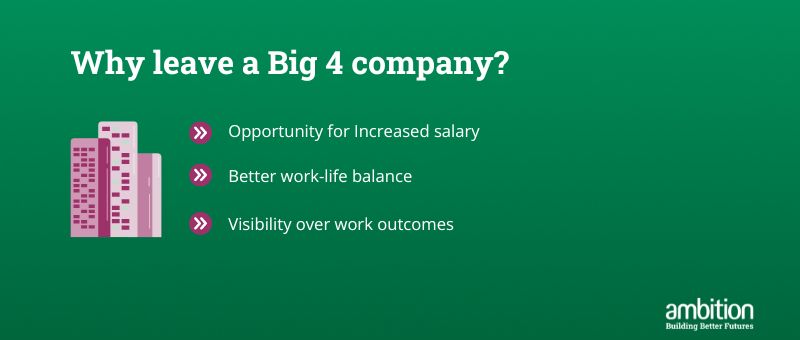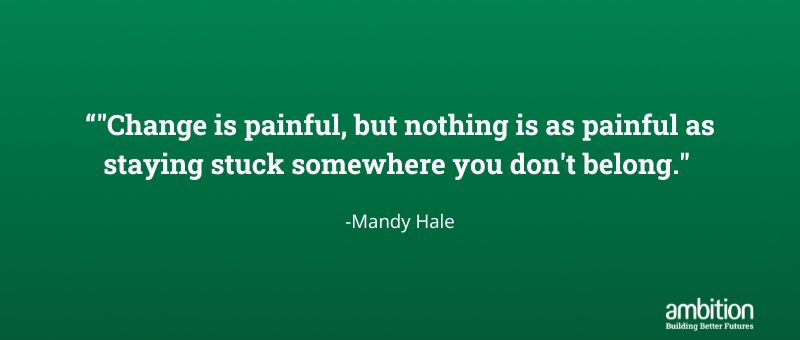Please beware of recruitment scams that are currently targeting jobseekers. Click here for further advice.

How to move out of the Big 4
Securing a job at one of the Big 4 is a landmark moment for financial services professionals.
However, as fulfilling as these roles can be, working in large accounting firms can be tough, with the long hours and demanding clients. Many people have re-evaluated their priorities, and a lot of candidates are now looking to move to industry to try something new and achieve a better work-life balance. It’s not surprising that I speak with a lot of people from Big 4 and mid-tier accounting firms wanting to move into industry.
Quick Links
Leaving the familiar structure, and clear progression offered in these firms can be tough, but it's important to know that there are lots of positions out there.
In this article, we'll discuss when is a good time to go, exit opportunities for those leaving the Big 4, and how you might go about making the shift.
The reality of the Big Four
The glamour and prestige associated with Big 4 firms are often the reason young and ambitious professionals flock to the Big 4, especially when they’re fresh out of university. This is understandable given how many doors a career in the Big 4 can open for you. However, what candidates often don’t realise is how challenging the Big 4 environment can be, especially from a work-life balance perspective.
When is a good time to leave a Big 4 company?
Choosing when to change jobs is a highly individual decision, impacted by your unique professional and personal situation. However, there are some general guidelines that you can bear in mind:
Getting your qualifications: Attaining your Chartered Accountant (CA) or Certified Public Accountant (CPA) qualifications are useful strings to your professional bow, especially if you plan to move into the commercial sector later. For the majority, following standard Big 4 progression, these milestones can be reached in 2-4 years.
Gaining soft skills: As you move up the ladder at the Big 4, you'll have been taking on more senior positions on individual projects. Having this experience under your belt is beneficial not only for your professional development but also soft skills such as leadership and communication.
Keeping your objectives in mind: This may seem counterintuitive but, depending on the role you're interested in moving into, having a more senior title attached to your name isn't always a good thing. For example:
If you're seeking an Accounting Manager role companies are likely interested in candidates with recent, hands-on accounting experience. Former Managers, or Senior Managers, from Big 4 companies often come with a significant price tag, and may be lacking up-to-date operational participation. That said if you're after a more technical commercial position, having a managerial title from the Big 4 can go a long way.

What opportunities are there when leaving a Big 4 company?
Where you decide to take your skills after leaving the Big 4 will hinge largely on your reasons for leaving. Among the most common motivating factors are:
Increased salary: Depending on where you go, you could see a pay rise of as much as 20 per cent.
Better work-life balance: It's no secret that Big 4 life can include some gruelling hours, whereas a commercial job is more likely to offer something closer to a straightforward 9-5.
Visibility over work outcomes: There's a lot to be said for the satisfaction of seeing how your work benefits a company. This is something that's often lacking for Big 4 employees, who are constantly dipping in and out of different organisations as required.
So, what are the common paths for those transitioning from the Big 4?
Strategy roles: If you're interested in turning your mind to more strategy driven tasks, analysis and financial planning positions are a popular option. Finance teams are playing increasingly central roles, working with employers to provide an understanding of the trends that shape long-term business development. This will likely be a significant departure from your day-to-day at a Big 4 firm and can be a highly rewarding experience.
Internal auditing: The idea of leaving the Big 4 and returning to auditing work might not seem thrilling. However, it's important to remember that commercial life will feel significantly different, in part for the three reasons listed above. Furthermore, internal auditing can be a great way to take your skills overseas, if your chosen employer is a multinational. Many companies like to move audit staff around different offices to ensure practices are consistent across all branches.
Operational accounting: If you've got a controller position in your sights, moving into a company as an operational accountant is a solid step in the right direction. Here you can easily apply your Big 4 accounting skills to help with the financial running of a company and ensure the daily activities are in line with budgeting requirements.
Your first move to industry
A move to industry can be a way to achieve a better work-life balance. However, it's important to note that your first move to industry will be a positive one - just like professional services firms, not all industry employers foster a good culture. Jumping at the first industry opportunity presented to you may lead to a disappointing experience and before long, you’ll be looking for your next move.
How to go about making your first move into industry
In preparing for your first move, you should highlight your transferable skills and experience on your resume. If you’re applying for a role directly with an employer, the person running the recruitment process (e.g., Talent Manager) may not always be clear on how your experience can be translated to an industry role. I think it’s a great idea to chat with multiple recruiters and hiring managers (ask lots of questions!) and most importantly, identify and understand what role is best suited to your skillset and your broader career goals.
Leverage your resources
Gather as much industry intel as possible by reaching out to industry finance leaders via LinkedIn or reach out to your alumni networks. Ask a senior finance leader to be your mentor. These resources can provide valuable insights and connections for making your first move into industry and also for your future moves.
Whilst moving into industry is an exciting next step for your career, it's important to approach it strategically and with a clear understanding of what you want out of your career. By taking the time to properly explore different possibilities and leveraging your networks, you can make a successful transition and achieve the work-life balance we all strive for.

Five takeaways
Moving out of a Big 4 environment and into industry can be a great opportunity to achieve a better work-life balance.
Ensure you highlight your transferable skills and experience on your resume, so employers understand why you are a good fit for the role.
Chat with multiple recruiters and hiring managers to help you identify and understand what role is best suited to your skillset and your broader career goals. Ask lots of questions!
Leverage your networks for industry intel.
Not all companies are created equally - jumping at the first opportunity without considering what's right for you is a mistake.
Where to look for a role after the Big 4?
When you're used to the steady progression of the Big 4, it can be hard to find that next step.
It's not always immediately obvious where your skills would be best suited, or what roles in the commercial sector would move you in the direction you want to go.
For these reasons, it's always useful to sit down with a recruitment professional who has an in-depth knowledge of the industry. They can help match your expertise and experience to the roles that best align with what you want out of professional life after the Big 4. Ambition has 25 years' of experience doing just that, to find out how we can help you, get in touch with our team today.

Written and edited by Jessica Gahang, Consultant - Commercial Finance & Accounting in Melbourne. After 6 years working as a state taxes litigator, Jess chose to start a career in recruitment. Her exposure to accounting and financial services gives Jess a sound understanding of what both employers are seeking in a potential candidate and what candidates are looking for when seeking a new role.






